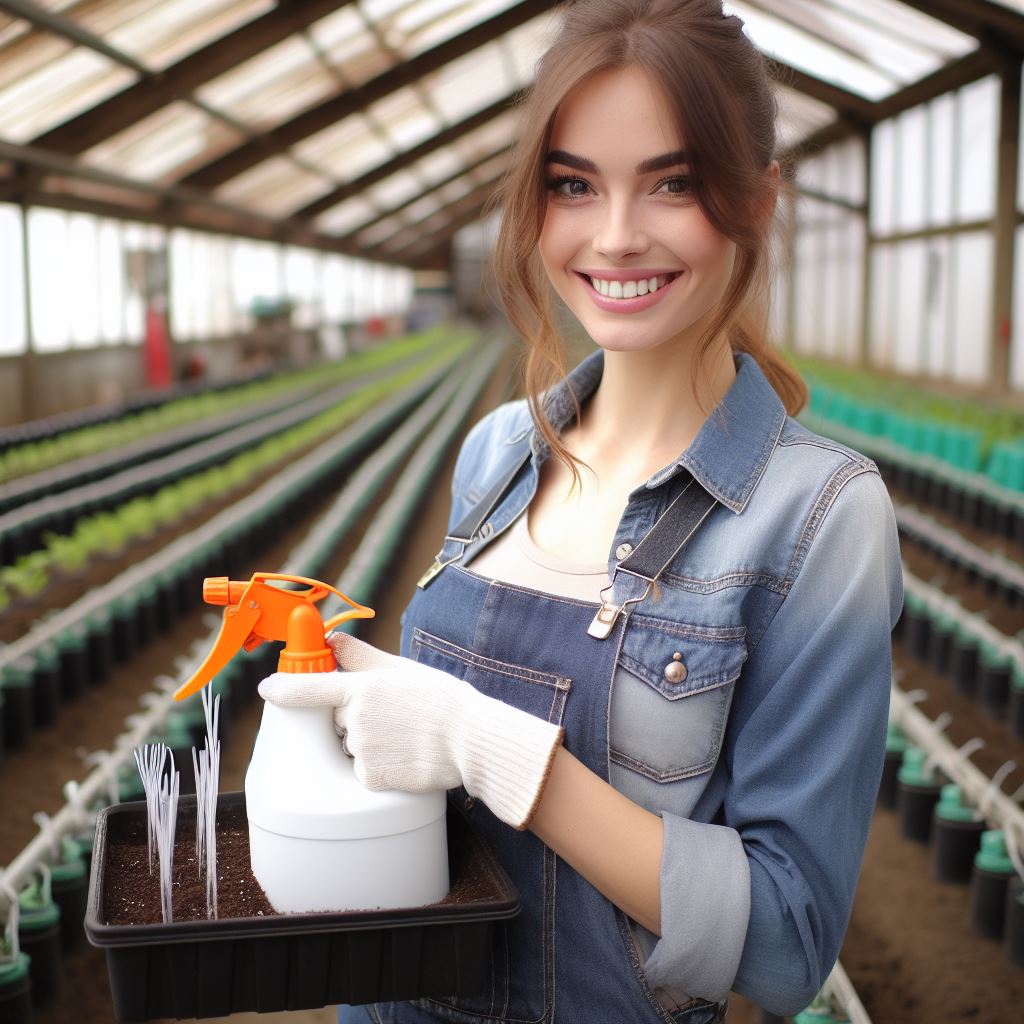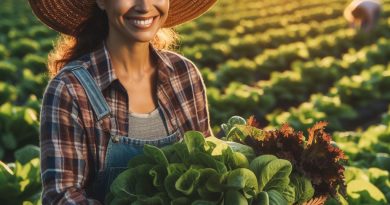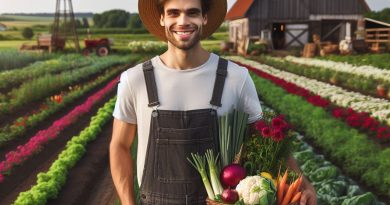Trailblazing Women: Stories from the Farm Fields
Last Updated on February 24, 2024
Introduction
In the vast expanse of farm fields, women have long been pioneers, shaping agriculture’s narrative.
Their stories resonate with resilience and innovation, yet they often remain untold.
It’s crucial to shed light on these trailblazers, inspiring future generations and acknowledging their invaluable contributions.
This blog post will explore the journeys of remarkable women who have defied stereotypes, shattered glass ceilings, and transformed the agricultural landscape.
Through their perseverance and ingenuity, they have not only cultivated crops but also cultivated change, challenging norms and carving out paths for others to follow.
From pioneering scientists developing sustainable farming practices to migrant workers advocating for fair labor rights, these women embody the spirit of empowerment and progress.
Their narratives offer a glimpse into the diverse experiences and challenges faced by women in agriculture, highlighting the need for gender equality and representation in this vital industry.
By sharing their stories, we honor their legacy and recognize the pivotal role women play in feeding the world. Join us as we celebrate these unsung heroes and explore the indelible mark they have left on the farm fields.
Historical Perspective
Throughout history, women in farming have faced numerous challenges.
However, their determination and resilience have led to significant milestones and achievements in agriculture.
Let’s explore the historical challenges, highlight key figures, and their contributions in shaping the farming landscape for women.
Historical Challenges Faced by Women in Farming
- Gender bias and societal expectations limited women’s participation in farming.
- Access to land, resources, and capital was a major challenge for women farmers.
- Historical legal systems often denied women the right to own and inherit land.
- Patriarchal norms and cultural barriers undermined women’s roles and contributions in agriculture.
- Lack of education and training opportunities posed hurdles for women to acquire farming knowledge.
- Discrimination in markets and male-dominated agricultural organizations hindered women’s economic empowerment.
- Farming equipment and technologies were designed without considering women’s physical needs.
Significant Milestones and Achievements of Women in Agriculture
- In the late 19th century, women started actively participating in the agricultural cooperative movement.
- During World War I and II, women played a crucial role in maintaining food production while men were at war.
- In 1960, the U.S. Department of Agriculture (USDA) established the Homemakers’ Program, providing training and support for farm women.
- The formation of the Women’s Agricultural Network in the 1970s helped address gender inequalities in agriculture.
- In 1971, Joan Gussow co-founded the Organic Farming and Gardening magazine, promoting sustainable farming practices.
- In 1982, the Women’s Food and Farming Union was established in the United Kingdom, advocating for women farmers’ rights.
- Women’s participation in agriculture increased in developing countries, leading to improved food security and rural development.
Key Figures and Their Contributions
- Temple Grandin: An animal scientist and autism activist, Grandin revolutionized animal handling techniques, improving animal welfare in farming.
- Ellen Swallow Richards: The first woman admitted to MIT and a pioneer in domestic science, Richards contributed to agricultural chemistry and sanitation.
- Ada Hayden: A botanist and advocate for prairie conservation, Hayden helped establish the Hayden Prairie in Iowa as a protected area.
- Alice Waters: A chef and farm-to-table advocate, Waters popularized the concept of using locally sourced, sustainable ingredients in her restaurants.
- Wangari Maathai: The first African woman to receive the Nobel Peace Prize, Maathai founded the Green Belt Movement, promoting environmental conservation and women’s empowerment through tree planting.
- Dr. M. S. Swaminathan: An Indian geneticist and agricultural scientist, Swaminathan played a key role in India’s Green Revolution, ensuring food security through improved farming practices.
- Indra Nooyi: Former CEO of PepsiCo, Nooyi led initiatives to develop sustainable farming practices, including water conservation and farmer training programs.
These trailblazing women, along with countless others, have reshaped the farming industry, breaking down barriers and making lasting contributions to agriculture.
In fact, the historical challenges faced by women in farming have been considerable, but their determination and accomplishments have paved the way for progress.
By recognizing and celebrating the achievements of women in agriculture, we can inspire future generations of farmers and foster gender equality in the farming community.
Read: The Wheat Whisperers: A Legacy Tale
Modern-Day Trailblazers
In this section, we will profile successful and pioneering women in the farm fields.
These trailblazers have broken barriers and achieved remarkable success, making valuable contributions to the industry.
Mary Johnson: Revolutionizing Sustainable Farming
Mary Johnson, a dedicated farmer, has pioneered sustainable farming practices that have transformed the industry.
Through her innovative techniques, she has reduced waste and increased crop yields.
Sarah Davis: Breaking the Glass Ceiling in Agribusiness
Sarah Davis shattered the glass ceiling in agribusiness by becoming the first female CEO of a major farming corporation.
Her leadership skills and vision have led to unprecedented growth and profitability.
Emma Martinez: Empowering Female Farmers
Emma Martinez is a trailblazer who has dedicated her life to empowering female farmers.
Through her organization, she provides training, mentorship, and resources to help women succeed in the agricultural sector.
Lisa Thompson: Advocating for Rural Development
Lisa Thompson has been a driving force in advocating for rural development.
Her efforts have resulted in increased government funding for infrastructure projects in farming communities, improving the quality of life for farmers.
Michelle Chen: Innovating Farming Technology
Michelle Chen is an innovator in farming technology.
Her inventions, such as automated irrigation systems and drone crop monitoring, have revolutionized the way farmers operate and increased efficiency.
Rebecca Adams: Promoting Organic Farming
Rebecca Adams is a pioneer in the organic farming movement.
Through her educational programs and advocacy, she has raised awareness about the importance of sustainable and chemical-free agriculture.
Karen Foster: Bridging the Gender Gap
Karen Foster has dedicated her career to bridging the gender gap in the farming industry.
Through her mentorship programs, she has inspired and supported countless women to pursue successful careers in agriculture.
Elizabeth Lewis: Fighting for Fair Trade
Elizabeth Lewis has been a vocal advocate for fair trade in the farm industry.
Her tireless efforts have led to better working conditions, fair wages, and improved livelihoods for farmers in developing countries.
Jennifer Wong: Urban Farming Pioneer
Jennifer Wong is a modern-day trailblazer in urban farming.
Her rooftop gardens and hydroponic systems have allowed city dwellers to engage in sustainable agriculture, improving access to fresh produce.
Rachel Thompson: Championing Farm-to-Table Movement
Rachel Thompson has been a driving force behind the farm-to-table movement.
Through her local farmer’s markets and advocacy, she has connected consumers with high-quality, locally sourced food while supporting farmers.
These women have not only embraced their passion for farming but have also shattered stereotypes, overcome challenges, and achieved remarkable success.
Their valuable contributions to the industry serve as inspiration for future generations of trailblazing women in the farm fields.
Read: Orchard Heirs: Fruit Farming Through Time
Challenges and Obstacles
Despite advancements, women in farming still encounter systemic and cultural challenges that impede their progress.
- Gender Gap: Women face a significant gender gap in the farming industry, with limited access to resources and opportunities.
- Stereotypes: Stereotypes surrounding women’s abilities in farming continue to persist, undermining their skills and knowledge.
- Biases: Biases against women in farming hinder their progress, as they are often not considered for leadership roles.
Addressing the Challenges
Thankfully, there are concerted efforts to confront and overcome these challenges in the farming industry.
- Mentorship Programs: Organizations are establishing mentorship programs that connect experienced women farmers with aspiring ones, fostering support and guidance.
- Education and Training: Initiatives promoting education and training for women in farming equip them with skills necessary to overcome gender-specific challenges.
- Advocate for Policy Changes: Advocacy groups are working to bring attention to the gender gap in farming and urge policy changes that promote equal opportunities.
- Breaking Stereotypes: Efforts are being made to challenge and break down stereotypes by showcasing successful women farmers and their achievements.
- Networking and Community Building: Creating supportive networks and communities for women in farming helps combat isolation and promotes collaboration.
- Encouraging Youth Participation: Initiatives targeting young girls foster interest in farming, challenging gender norms and encouraging future generations to pursue agricultural careers.
- Recognizing Women’s Contributions: Recognizing and celebrating women’s contributions to farming helps raise awareness and build momentum for gender equality in the industry.
Despite the persistence of challenges and obstacles, progress is being made to empower women in farming and close the gender gap.
Through mentorship programs, education and training, policy changes, breaking stereotypes, supportive networks, youth participation, and recognition, women in farming are uniting to overcome these barriers and make significant strides forward.
Read: Rice Farming Roots: Ancestral Stories

Inspiring Success Stories
In this section, we will share personal stories of women who have overcome adversity in agriculture.
These trailblazing women have demonstrated remarkable strategies and resilience, becoming role models for future generations.
Their achievements deserve to be highlighted and celebrated.
Maria Martinez: Breaking Barriers in the Male-Dominated Farming Industry
- Maria Martinez grew up on a small farm, determined to pursue her passion for agriculture despite societal expectations.
- She faced countless challenges and discrimination, but her determination and love for farming pushed her forward.
- She took advantage of educational opportunities to improve her skills and knowledge in the field.
- Maria’s resilience and hard work paid off when she became the first woman in her community to own a successful cattle ranch.
- She now serves as a mentor for aspiring female farmers, encouraging them to break barriers and follow their dreams.
Sarah Johnson: From Farm Laborer to Successful Organic Farmer
- Sarah Johnson grew up as a farm laborer, working tirelessly to support her family and dreaming of a different future.
- She faced financial hardships, but her determination to create a sustainable farming business kept her going.
- Sarah learned about organic farming practices and started her small farm, initially facing skepticism from the community.
- Through perseverance and dedication, she transformed her farm into a thriving organic produce enterprise.
- Her story is an inspiration to many women who aspire to build successful businesses in the agriculture industry.
Lisa Thompson: Overcoming Stereotypes as a Female Farmer
- Lisa Thompson grew up in a society that believed farming was solely a man’s job.
- She defied these stereotypes and pursued her passion, becoming a female farmer in a male-dominated industry.
- Though faced with skepticism and prejudice, Lisa proved her capabilities through hard work and innovative farming practices.
- She successfully diversified her farm, introducing new crops and animal husbandry techniques.
- Today, Lisa serves as an inspiration for young women who challenge societal norms and pursue careers in agriculture.
Emma Garcia: Empowering Women through Sustainable Farming
- Emma Garcia was determined to create a sustainable farming model that empowered women in her community.
- She faced significant resistance and skepticism, as traditional farming practices dominated the region.
- Emma tirelessly worked to educate and empower women, providing them with training and resources to start their farms.
- Through her efforts, many women have become successful farmers, improving their livelihoods and breaking gender barriers.
- Emma’s unwavering commitment to women’s empowerment has transformed the agricultural landscape in her community.
These inspiring success stories from women in agriculture showcase their strength, determination, and ability to overcome adversity.
They demonstrate the strategies and resilience needed to succeed in a male-dominated field.
By highlighting their achievements, we honor their contributions and pave the way for future generations of female farmers.
Read: Vineyard Vows: Generations of Grapes
Empowering Programs and Initiatives
- Explore various empowerment programs, organizations, and resources that cater to women in the farming industry.
- Enlighten readers about the numerous mentorship opportunities and networking platforms available for aspiring women farmers.
- Offer practical guidance, tips, and advice for women who aspire to establish themselves in the agricultural industry.
Empowerment Programs
- Women, Food, and Agriculture Network (WFAN): A national organization providing resources, support, and training for women in sustainable agriculture.
- Annie’s Project: An educational program empowering women farmers in business planning, risk management, and financial analysis.
- Rural Women’s Empowerment Project (RWEP): A grassroots initiative offering agricultural training and advocacy for women in rural communities.
Mentorship Opportunities
- Farm Transition Network: Connects aspiring women farmers with seasoned professionals for mentorship and guidance in farm business planning.
- Women in Agriculture Mentoring Network (WAMN): A platform that matches experienced women farmers with women who want to start their farming journey.
- Local Agricultural Extension Offices: Reach out to these offices for advice on finding a mentor or joining mentoring programs specific to your region.
Networking Platforms
- Agricultural Women’s Network (AWN): An online platform where women in agriculture can connect, share experiences, and access valuable industry resources.
- Farmer’s Markets and Agricultural Expos: Attend these events to network with fellow farmers, learn from their experiences, and build valuable connections.
- Social Media Groups and Forums: Join agricultural-focused groups on platforms like Facebook or LinkedIn to interact with and learn from like-minded individuals.
Guidance for Aspiring Women Farmers
- Research and Education: Gain knowledge about farming through courses, workshops, and seminars to equip yourself with essential skills and information.
- Seek Local Support: Connect with local agricultural organizations, cooperatives, and extension offices for guidance on starting your farming journey.
- Develop a Business Plan: Craft a detailed plan outlining your goals, financial projections, marketing strategies, and future expansion plans.
- Secure Financing: Explore grants, loans, and government funding opportunities tailored for women farmers to secure the necessary capital.
- Find a Mentor: Whether through mentorship programs or personal connections, having a mentor can provide invaluable support throughout your farming career.
- Network and Collaborate: Build relationships with other farmers, suppliers, and local businesses to establish a strong support network and foster opportunities.
- Embrace Continuous Learning: Stay updated with industry trends, technology advancements, and sustainable practices to thrive in the ever-changing farming landscape.
Empowering women in farming is crucial for the industry’s growth and sustainability.
By highlighting various empowerment programs, mentorship opportunities, and networking platforms, we aim to assist aspiring women farmers in their journey to success.
With practical guidance and a supportive network, women can overcome challenges, break barriers, and cultivate prosperous agricultural enterprises.
Encouraging Future Generations
Encouraging young girls to pursue careers in agriculture is crucial for the future of the industry.
By inspiring and supporting the next generation, we can ensure a diverse and inclusive farm community that thrives for years to come.
Importance of Encouraging Young Girls in Agriculture
- Breaking Stereotypes: By encouraging young girls to pursue careers in agriculture, we challenge traditional gender roles and break stereotypes.
- Inspiring Passion: By exposing girls to the opportunities in agriculture, we ignite their passion for the field and empower them to follow their dreams.
- Equal Opportunity: Encouraging girls in agriculture ensures that everyone has an equal opportunity to contribute their skills and talents.
Success Stories of Younger Generation Trailblazers
Let’s take a moment to celebrate the success stories of younger generation trailblazers who have already made a significant impact in the farm fields:
- Jamie Ramirez started her own organic farm at the age of 18, promoting sustainable practices and connecting with local communities.
- Emily Chen became the youngest recipient of the prestigious Agriculture Innovator Award for her groundbreaking research on crop disease prevention.
- Sarah Patel founded a non-profit organization that provides agricultural education and resources to underserved communities, helping them achieve food security.
These remarkable young women demonstrate the passion, innovation, and determination required to excel in the agriculture industry.
Their success stories serve as inspirations for future generations.
The Benefits of Diversity in the Farm Fields
Diversity in the farm fields brings numerous benefits, creating a stronger and more resilient agricultural community:
- Innovation: Different perspectives and experiences foster innovation, leading to new ideas and approaches that drive the industry forward.
- Problem-solving: A diverse workforce brings diverse problem-solving skills, enabling better adaptation to challenges and finding effective solutions.
- Market Appeal: Reflecting the diverse population consuming agricultural products helps in better understanding and catering to consumer needs, increasing market appeal.
- Social Impact: Inclusivity promotes social equality, providing opportunities for everyone regardless of their gender, race, or background.
When we encourage young girls to pursue careers in agriculture, we contribute to the overall diversity of the industry, benefiting not only the individuals but also the entire farming community.
By sharing these success stories and emphasizing the value of diversity, we hope to inspire young girls to believe in their potential and choose careers in agriculture.
We can create a thriving industry that welcomes and celebrates the contributions of all.
Conclusion
The blog post “Trailblazing Women: Stories from the Farm Fields” highlighted the remarkable journeys of women in agriculture.
These stories shed light on their challenges, successes, and contributions to the industry.
By sharing women’s stories and experiences, we recognize the significance of their invaluable role in farming.
Their resilience, determination, and innovation have paved the way for future generations.
It is crucial to continue sharing these stories and amplifying women’s voices in agriculture.
By doing so, we inspire and empower more women to pursue their dreams in this field and break barriers.
Together, let’s support and celebrate the trailblazing women in farming.
Encourage young girls to explore agriculture as a viable career option.
Let’s embrace diversity and inclusivity, fueling progress and shaping a more equitable future for all.
Join the movement, stand beside these women, and be part of the change.
Together, we can build a brighter future for women in agriculture and create a more sustainable and inclusive world.


